The Most Sublime Porte - An Ottoman AAR
- Thread starter Riotkiller
- Start date
-
We have updated our Community Code of Conduct. Please read through the new rules for the forum that are an integral part of Paradox Interactive’s User Agreement.
You are using an out of date browser. It may not display this or other websites correctly.
You should upgrade or use an alternative browser.
You should upgrade or use an alternative browser.
Threadmarks
View all 63 threadmarks
Reader mode
Reader mode
Recent threadmarks
Chapter Fifty-Four: New Challenges (1928-1929) Chapter Fifty-Five: The Ottoman Golden Age (1930-1934) Chapter Fifty-Six: Scandal and Conflict (1934-1937) Chapter Fifty-Seven: The Caucasian War (Part I) Chapter Fifty-Eight: The Caucasian War (Part II) Chapter Fifty-Nine: The End of an Era (1938-1940) Chapter Sixty: The Bulldog Imperilled (1939-1943) Chapter Sixty-One: Troublesome Greeks (1943-1945)The Ottomans appear to be carrying the entire war effort almost single-handedly. The ejection of the British from Arabia could prove to be a decisive turning point in the war, allowing the Porte to free up a few regiments elsewhere -- assuming there's still a war on when they get there, which is unfortunately starting to look doubtful if the Germans can't reverse their slow contraction.
attention moved back to the Caucasian Front, where General John Madden proved he had learned little from his countryman’s failure at Qatif.
FOOTBALL!!!
But seriously, this was a major reversal for the Russians and British in the Near East. I just hope the Ottomans can keep up the momentum and carry the day. Still boggles my mind how the Germans messed this up.
I have to be honest, the best chances for Ottoman survival are probably depending on a seperate peacedeal. Germany is losing but the Ottomans are holding their own, but only because they are handling secondary fronts. A peacedeal with a secondary enemy is certainly an option
The British certainly should have stuck to their ships. Those are some truly ugly battles.
Wow, the British are certainly hurting here. If only dealing with the Russians and French was so easy.
Aye, 1906 saw a much improved performance by the Ottoman army, and we will not go down without a fight!Certainly making them pay for it!
The Ottomans appear to be carrying the entire war effort almost single-handedly. The ejection of the British from Arabia could prove to be a decisive turning point in the war, allowing the Porte to free up a few regiments elsewhere -- assuming there's still a war on when they get there, which is unfortunately starting to look doubtful if the Germans can't reverse their slow contraction.
Indeed, if the German army had performed as well as ours then the war would surely be over in favour of the Alliance. Alas, their struggles are not something we can easily rectify, and the loss of the Army of Bosnia that we sent to help them was a bitter blow there.FOOTBALL!!!
But seriously, this was a major reversal for the Russians and British in the Near East. I just hope the Ottomans can keep up the momentum and carry the day. Still boggles my mind how the Germans messed this up.
I have to be honest, the best chances for Ottoman survival are probably depending on a seperate peacedeal. Germany is losing but the Ottomans are holding their own, but only because they are handling secondary fronts. A peacedeal with a secondary enemy is certainly an option
Due to both being junior members in the war, we can't make a separate peace with the British, no. Of course, if the British are so humiliated that they decide to seek a separate peace with Germany then that would be great, but right now the British government continues to hold out.Would you able to make a separate peace deal with Britain?
The punitive peace terms that surrendering to the Russians would entail are under consideration, but would almost certainly be immediately followed by further defeat to the Austro-Hungarians, so they truly are a last resort...
The British certainly should have stuck to their ships. Those are some truly ugly battles.
Indeed. The British army's abysmal display in the war is matched only by that of the Spanish (the Italians at least had the excuse of being heavily outnumbered and not very prepared). The French military on the other hand appears to be the best in the world, and the Russians are at least able to match ours.Wow, the British are certainly hurting here. If only dealing with the Russians and French was so easy.
things are grim and hopeful at the same time. we should clean our house and slowly push the russians back, but what to do about the austrians in this case? germany is a huge disappointment and so is the involvement level of usa.
Chapter Forty-Four: The End of the Great War (1907)
At an Allied War Conference in Constantinople in January 1907, the true scale of the challenges facing the Allies was laid bare for all to see. The Spanish government-in-exile was threatening to sign a separate peace, and only extremely smart diplomatic work by the German and Ottoman delegates was able to persuade the Spaniards to stay in the war. But no amount of diplomacy could persuade the Americans to send more troops over after the disaster at the Azores, and with the Belgian and German armies in full retreat, it was clear that the only forces that could be relied on were those of the Ottoman Empire and those of the Empire of Japan – and the latter were unfortunately unable to influence matters on the decisive fronts.
Following the War Conference, Grand Vizier Hilmi Pasha was left feeling profoundly depressed, believing that the conference had shown once and for all that the war could not be won. Consequently discussion now took place with the Ottoman Chiefs of Staff on how to best maximise the damage limitation from the outcome of the war, and if at all possible avoid territorial concessions. With the Entente powers demanding huge reparations and a massive cut to the size of the army in return for peace, and Austria-Hungary still demanding the return of Croatia, it was clear that surrendering to the Entente would almost certainly lead to capitulation to the Habsburg’s being unavoidable. As such, Hilmi Pasha hoped that more lenient peace terms could be won by inflicting more damaging defeats on the Entente forces, even though they would be unlikely to change the wider strategic picture.
The defeat of the British invasion of Mesopotamia could potentially free up significant Ottoman forces to send to the Balkan Theatre, but the Russian liberation of Circassia and Georgia had now reduced the territory we held there to the coastal city of Poti and land around the city of Akhaltsikhe, both of which now had significant Russian armies attempting to liberate them. Furthermore Russian forces had occupied almost the entirety of Ottoman Azerbaijan, and significant swathes of Armenia, while parts of Anatolia were still under British control despite the defeat of their main field armies. As a result, only Rifat Pasha’s Army of Cyrenaica began the long transfer west, with hopes of a lenient peace now focused on inflicting maximum damage on the chief opposition of the war: The Russians.
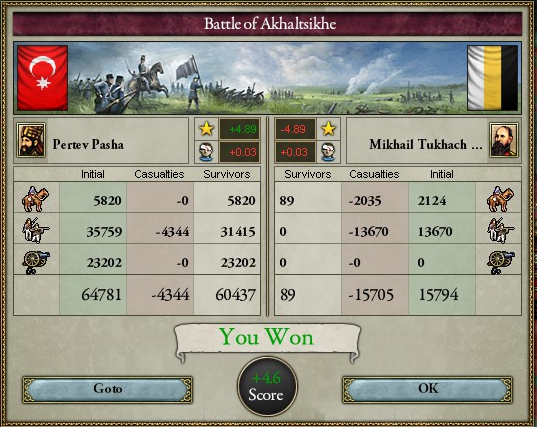
The Russians suffer a heavy defeat at Akhaltsikhe (January 1907)
The first strike against the Russians was made by Pertev Pasha’s Army of Syria, which had been reinforced significantly over the winter by conscript forces. Attacking Tukhachevsky’s smaller forces at Akhaltsikhe a significant victory was achieved with few Russians escaping, ensuring that further Russian attention would be needed to complete their liberation of lands, while the few casualties suffered by Ottoman forces ensured that further offensive operations could be launched in future.
Meanwhile in the Balkans, Said Pasha’s lone Army of Rumelia had continued to fight the Greeks ever since defeating their invasion of Thessaly in 1905, and had by now occupied much of Attica. The Greeks were one of the Entente powers most likely to demand Ottoman territory in peace negotiations, and so Hilmi Pasha was determined to force them out of the war even at the cost of allowing the Habsburg forces to occupy much of the Balkans down to Belgrade and Sarajevo almost unopposed. Despite the criticism he received for this, he was vindicated on February 27th 1907 after the Siege of Athens finally ended in an Ottoman victory and the Greek government sued for peace. While some hawks in the Ottoman parliament had demanded territorial concessions from Greece in the Aegean Sea and a few even cried for full annexation, Hilmi was loathe to risk the Greeks continuing the war and being rewarded with Thessaly, Crete, or any other claims later on, and so all that was demanded was costly financial reparations and a limit on the size of the demobilised Greek Army.
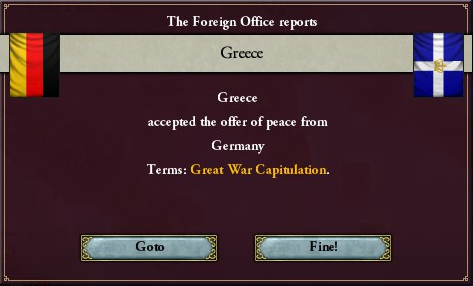
The Kingdom of Greece surrenders following the fall of Athens to Ottoman troops (February 27th 1907)
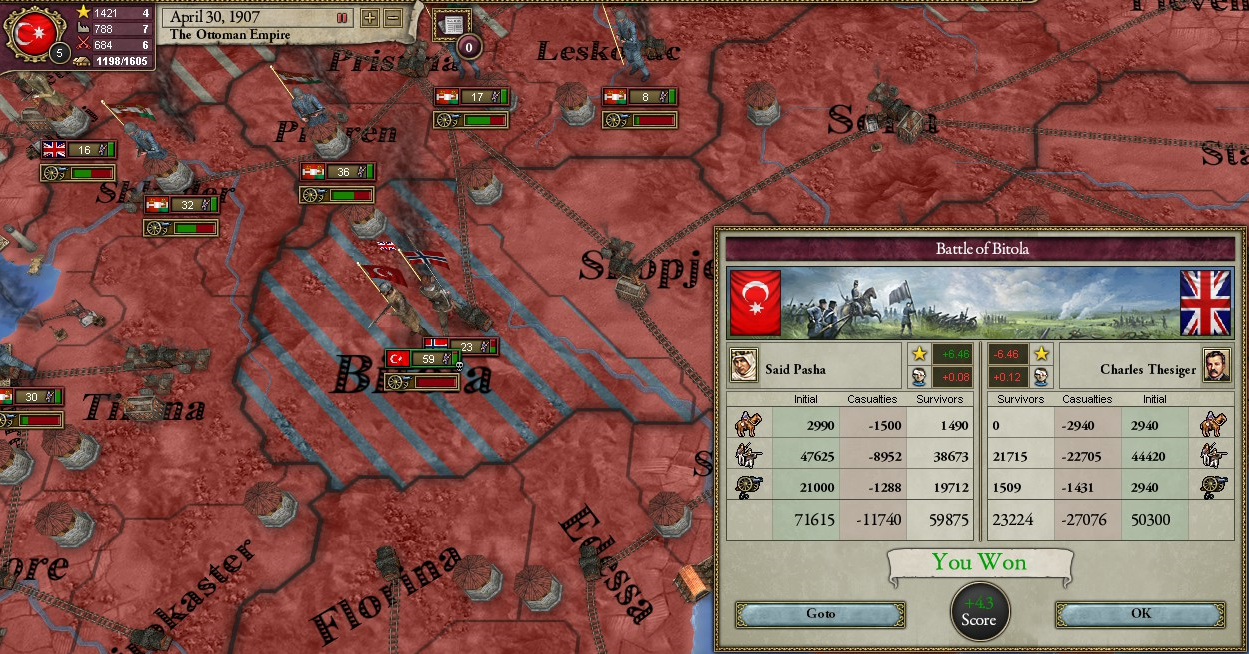
The Balkan Front after the Battle of Bitola in April 1907
It turned out that the armistice with the Greeks had not been signed a moment too soon. The British forces, so humiliated in Arabia and Mesopotamia in 1906, determined to reclaim their honour and made multiple landings in Montenegro, Albania, and Epirus in March 1907. Had Said Pasha still been fighting in Greece then it is likely the Balkan Front would have collapsed entirely, but with the armistice signed he was able to rail his troops with impressive speed to face the disorganised British landings and inflict another defeat on the British at Gjirokaster at the end of the month. As April passed with more bad news from the Western Front (where the Kingdom of Belgium had capitulated to the advancing French tide on April 15th) and the Russians beginning to advance on Berlin, another British force under General Charles Thesiger was defeated at Bitola and heavy casualties once more inflicted upon the British - though critically neither British army had been annihilated.
Unfortunately, Hilmi Pasha had not counted upon the German collapse freeing up significant Habsburg forces from the fighting in Bavaria and Silesia, and in June 1907 a major new Austro-Hungarian offensive was launched against the Porte in Macedonia and Bulgaria, linking up with Russian forces that had occupied Rumania and were marching into Dobrudja. The Habsburg forces were performing well in the field – or at least far better than the British – and whilst Said Pasha was able to repulse two attacks on Skopje in June and August, it was clear that reinforcements would be needed to rescue the front. Reinforcements that were simply not available.

The first and second battles of Skopje after the Habsburg troop surge in Summer 1907
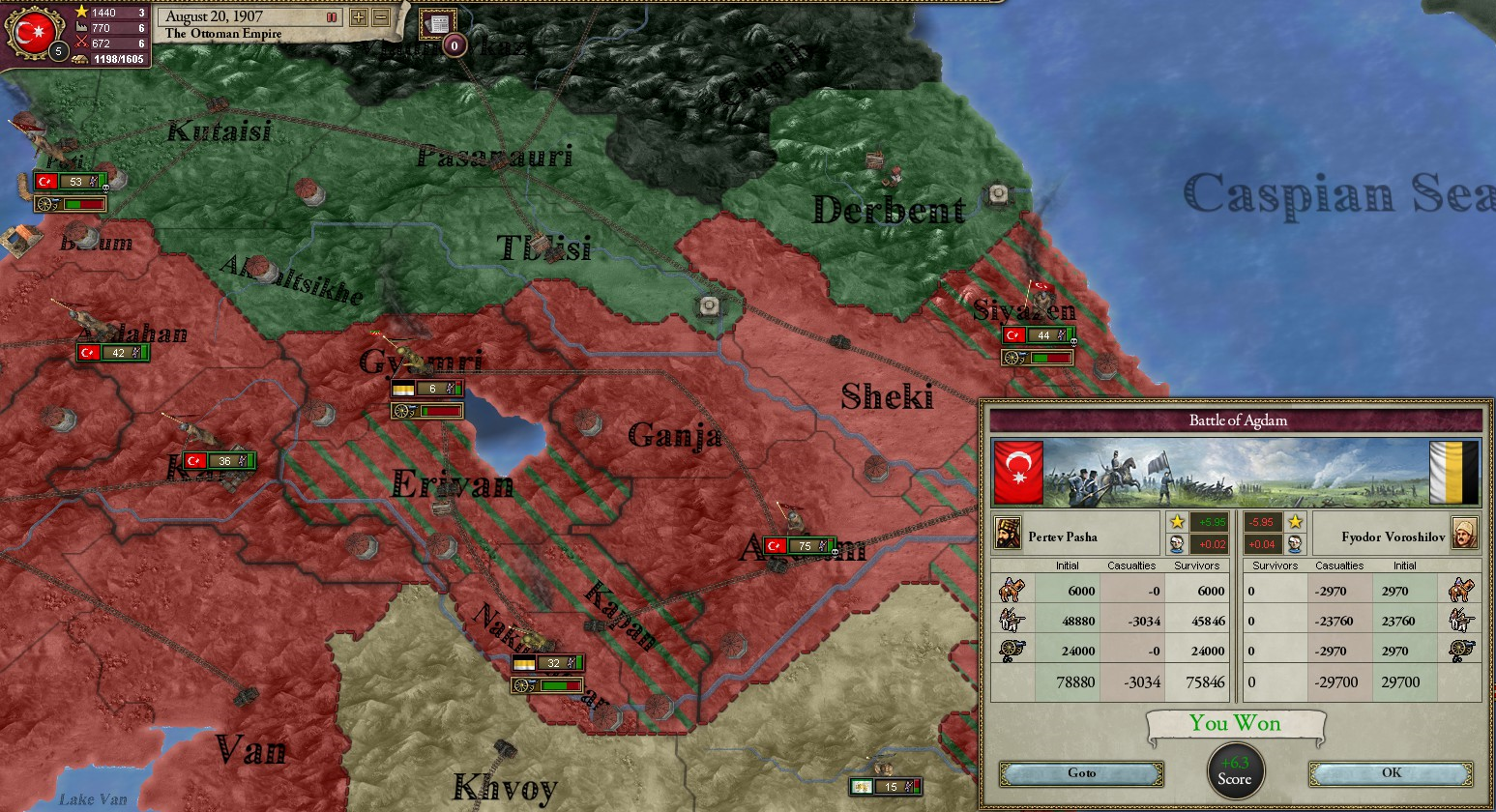
Pertev Pasha scores a major victory at Agdam in the Ottoman Caucasian Offensive of Summer 1907
Tasked with the full liberation of Armenia and Azerbaijan in Spring before the Habsburg Offensive had been launched, as these vilayets had been deemed those most likely for the Russians to demand if they could, Pertev Pasha’s Army of Syria, supported by the Army of Anatolia, had advanced deep into Azerbaijan and liberated the cities of Sheki and Agdam by August, while the Army of Abyssinia was attempting to retake control of Poti once more when the news of the renewed Habsburg attack reached the front, meaning it was too late for further armies to be transferred away to Europe. The belief that the Russians would target the Caucasus rather than Europe had been similarly misguided, but all that could be done now was to inflict as much damage on the Russian forces that had attacked in the Caucasus, and Pertev Pasha made sure to do just that. At Agdam he lured a full Russian army under the inexperienced Fyodor Voroshilov into attacking what he thought to be a separated Ottoman division but in fact was merely bait. As Voroshilov entered one of the high mountain passes he suddenly found himself facing the full might of an entrenched Army of Syria, and his army was utterly destroyed. Pertev Pasha had made a success of the task given to him, but it was to prove almost the last hurrah of the Ottoman war effort.
Even as news was filtering through to Constantinople of Pertev’s great victory, an even greater catastrophe was looming on the Balkan Front. The Entente Control of the sea had reached such a level that they were able to trap our ships beyond the Dardanelles and grave news arrived that our most feared foes, the French Army, had landed in force in Thrace and were planning to open the straits. Rifat Pasha’s Army of Cyrenaica attempted to drive them back into the sea, but the results were disastrous. At the Battle of Edirne Rifat’s force was all but eliminated by a massive combined Franco-Russo-Finnish army, while four days later on August 29th news of a further disaster arrived with Said Pasha’s Army of Rumelia defeated in a massive battle at Sofia. The road to Constantinople was wide open, and the government began immediately to evacuate to Ankara in the Anatolian interior.
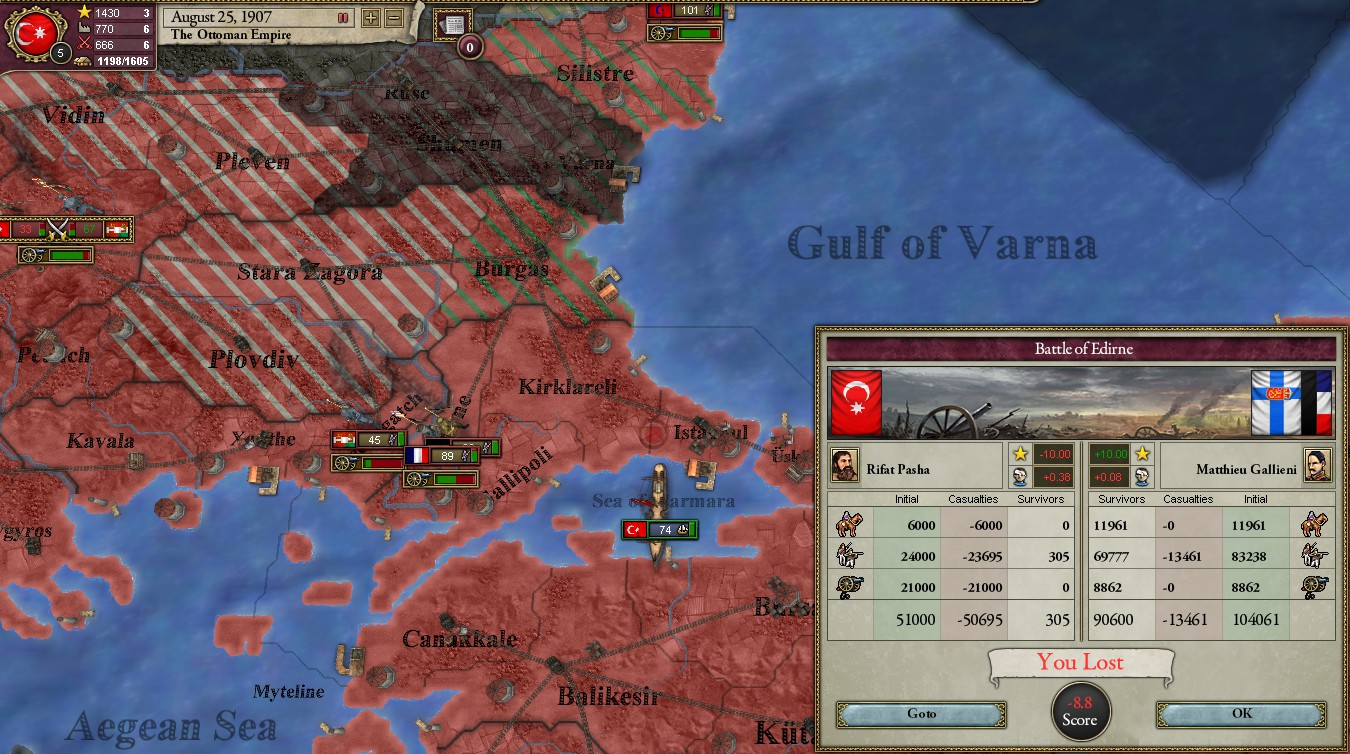
French landings in Thrace lead to the disaster at Edirne in August 1907
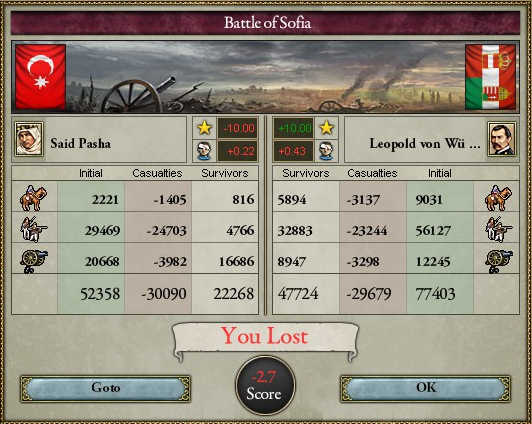
Outnumbered Ottoman forces are defeated at Sofia in August 1907
Hilmi Pasha still hoped to prevent the Russians from making any territorial demands however, and Pertev Pasha’s army scored another victory at Nakhichevan in early September to defeat the final Russian army in the Caucasus. Surprising good news was also received when Ottoman forces in Morocco inflicted a major defeat on the French at Tetouan through October, but in truth these battles were meaningless to the result of the conflict. Berlin had fallen to the Russians on October 18th and Constantinople on October 29th. Hopes that the capital might yet be saved by Said Pasha’s remaining forces foundered after another narrow defeat at Petrich, and the Ottoman government made the difficult decision to officially request an armistice, which after much negotiation was signed on December 6th 1907.
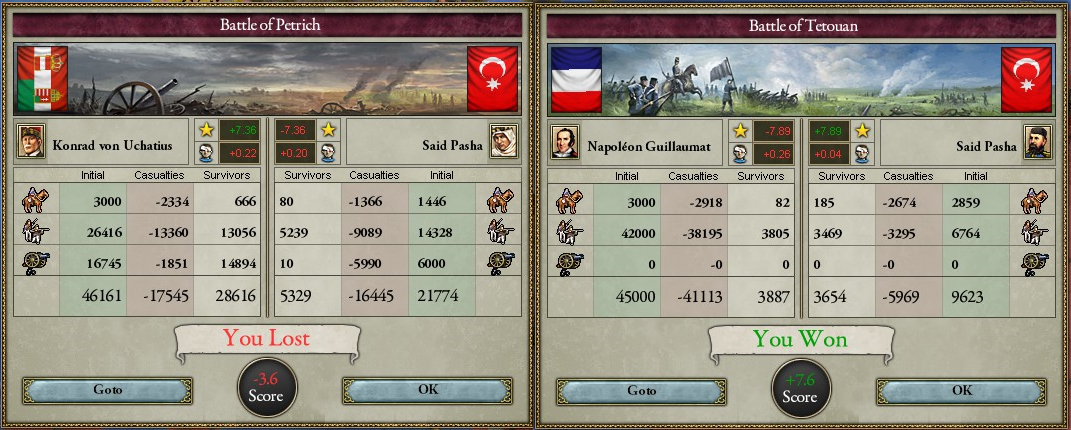
The Ottoman defeat at Petrich ensures that Constantinople falls to the Entente, while Tetouan saw the last Ottoman battle of the Great War (November 1907)
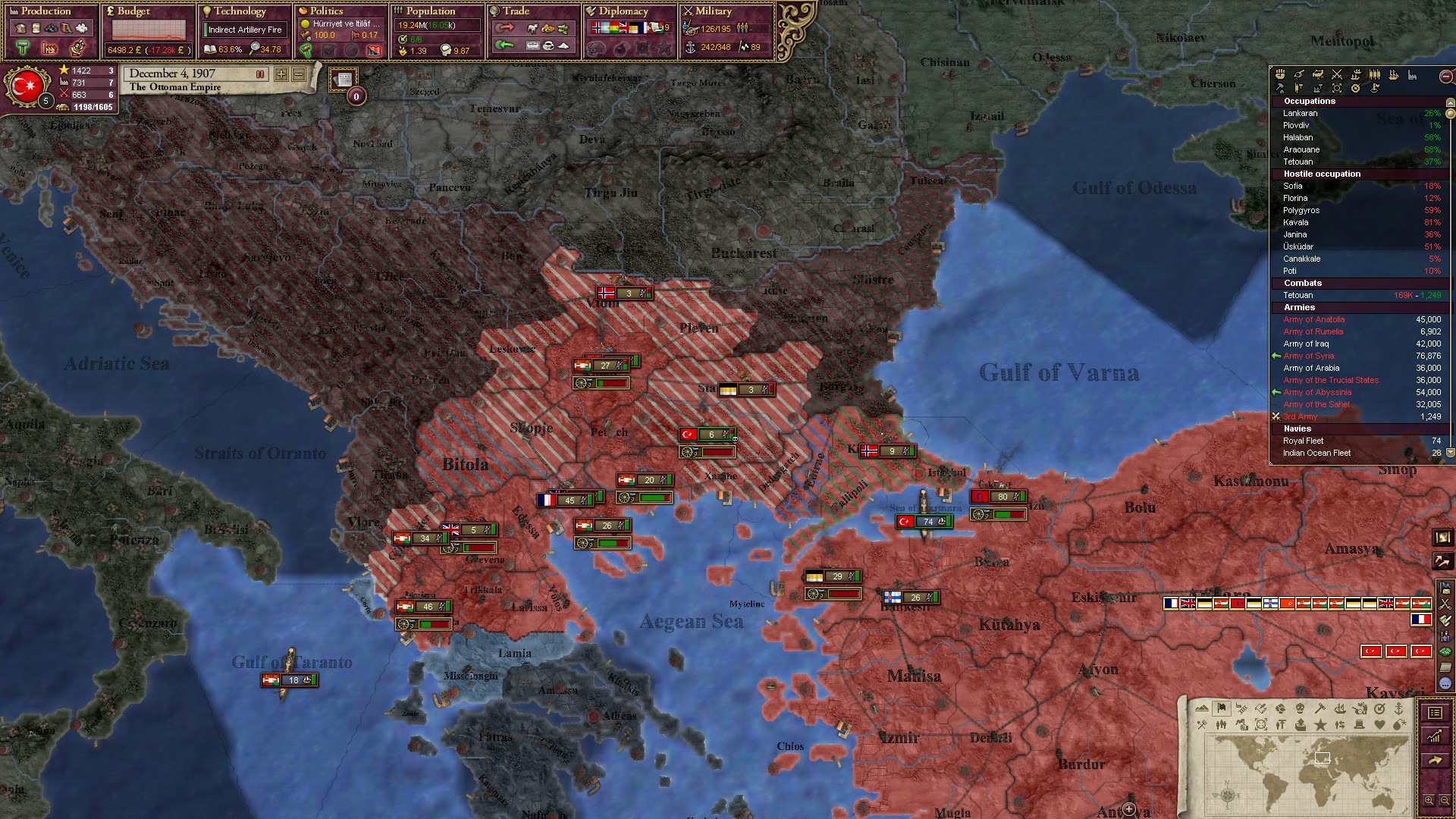
The Balkan Front at the time of the armistice to end Ottoman involvement in the Great War
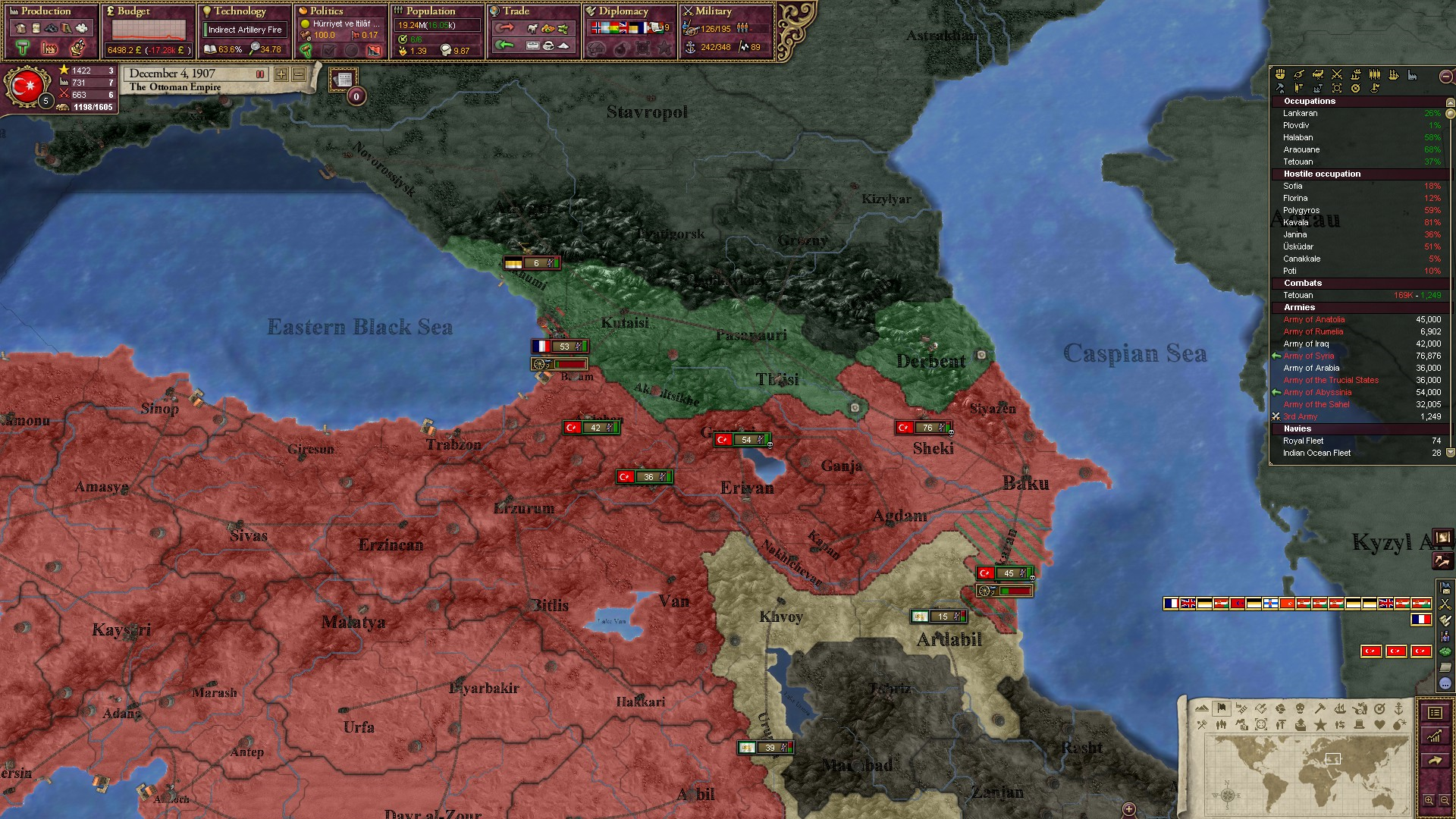
The Caucasian Front at the time of the armistice to end Ottoman involvement in the Great War
To his credit the Grand Vizier had achieved his goal of avoiding any territorial concessions, with the British and French unwilling to tolerate continued Russian presence in Constantinople due to the anticipated major Russian gains that would be made at the expense of Germany. The remaining Ottoman field armies were also numerous enough to drag the war out for another year at least and inflicted tens of thousands more casualties upon the invaders if forced to fight to the bitter end, with Hilmi Pasha threatening to cancel negotiations when ludicrous demands for the Russian re-annexation of Azerbaijan and British acquisition of the Gulf Coast were proposed. The Treaty of Edirne therefore agreed to pay reparations totalling 25% of the Ottoman revenue to the Entente Powers for five years, and to demobilise the Ottoman army down to a quarter of its pre-war strength for the same period of time. Despite knowing that this would almost certainly spell the end of resistance against the Habsburg’s, Hilmi Pasha knew it was the best offer he would get, and the treaty was signed.
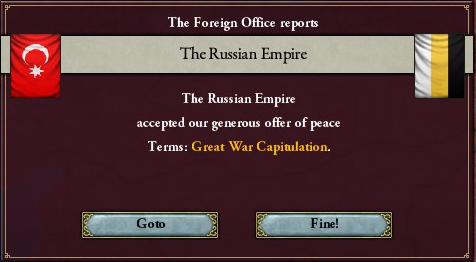
The Ottoman Empire signs an armistice with the Entente Powers (December 6th 1907)
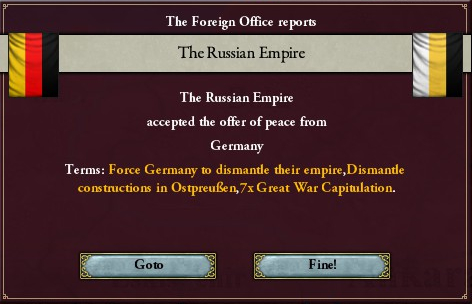
The German surrender marks the end of the Great War (January 12th 1908)
The Great War itself would in fact last another month before the broken Germans offered their own surrender, with Entente occupation of their country utterly complete, and an armistice being signed on January 12th 1908 to officially end the ‘war to end all wars’. The war with Austria-Hungary had one final twist, with Pertev Pasha’s remaining forces having been hurriedly transferred for one last attempt to defeat the Habsburgs. Pertev in fact managed to defeat the Austro-Hungarian forces at Dedeagatch in February 1908, but at such a high cost that it was clear that continuing the offensive would only delay the inevitable. The Treaty of Zagreb was therefore signed with Austria-Hungary on March 9th 1908, ceding the vilayet of Croatia back to the Habsburg’s but avoiding the loss of Slavonia due to Habsburg concern over Dedeagatch and the fact that they now fought without any allies. The Great War was over, the guns had fallen silent at last. And the Sublime Porte had lost.
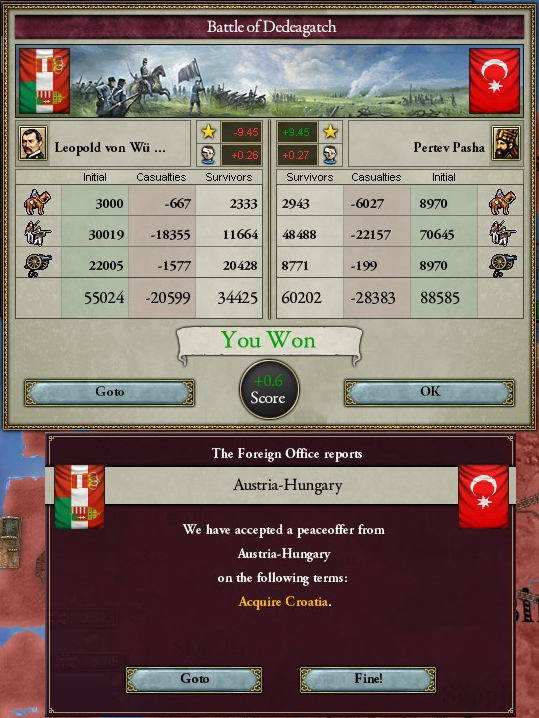
The Pyrrhic victory of Dedeagatch forces the Sublime Porte to accept Habsburg terms of surrender (March 9th 1908)
Following the War Conference, Grand Vizier Hilmi Pasha was left feeling profoundly depressed, believing that the conference had shown once and for all that the war could not be won. Consequently discussion now took place with the Ottoman Chiefs of Staff on how to best maximise the damage limitation from the outcome of the war, and if at all possible avoid territorial concessions. With the Entente powers demanding huge reparations and a massive cut to the size of the army in return for peace, and Austria-Hungary still demanding the return of Croatia, it was clear that surrendering to the Entente would almost certainly lead to capitulation to the Habsburg’s being unavoidable. As such, Hilmi Pasha hoped that more lenient peace terms could be won by inflicting more damaging defeats on the Entente forces, even though they would be unlikely to change the wider strategic picture.
The defeat of the British invasion of Mesopotamia could potentially free up significant Ottoman forces to send to the Balkan Theatre, but the Russian liberation of Circassia and Georgia had now reduced the territory we held there to the coastal city of Poti and land around the city of Akhaltsikhe, both of which now had significant Russian armies attempting to liberate them. Furthermore Russian forces had occupied almost the entirety of Ottoman Azerbaijan, and significant swathes of Armenia, while parts of Anatolia were still under British control despite the defeat of their main field armies. As a result, only Rifat Pasha’s Army of Cyrenaica began the long transfer west, with hopes of a lenient peace now focused on inflicting maximum damage on the chief opposition of the war: The Russians.

The Russians suffer a heavy defeat at Akhaltsikhe (January 1907)
The first strike against the Russians was made by Pertev Pasha’s Army of Syria, which had been reinforced significantly over the winter by conscript forces. Attacking Tukhachevsky’s smaller forces at Akhaltsikhe a significant victory was achieved with few Russians escaping, ensuring that further Russian attention would be needed to complete their liberation of lands, while the few casualties suffered by Ottoman forces ensured that further offensive operations could be launched in future.
Meanwhile in the Balkans, Said Pasha’s lone Army of Rumelia had continued to fight the Greeks ever since defeating their invasion of Thessaly in 1905, and had by now occupied much of Attica. The Greeks were one of the Entente powers most likely to demand Ottoman territory in peace negotiations, and so Hilmi Pasha was determined to force them out of the war even at the cost of allowing the Habsburg forces to occupy much of the Balkans down to Belgrade and Sarajevo almost unopposed. Despite the criticism he received for this, he was vindicated on February 27th 1907 after the Siege of Athens finally ended in an Ottoman victory and the Greek government sued for peace. While some hawks in the Ottoman parliament had demanded territorial concessions from Greece in the Aegean Sea and a few even cried for full annexation, Hilmi was loathe to risk the Greeks continuing the war and being rewarded with Thessaly, Crete, or any other claims later on, and so all that was demanded was costly financial reparations and a limit on the size of the demobilised Greek Army.

The Kingdom of Greece surrenders following the fall of Athens to Ottoman troops (February 27th 1907)

The Balkan Front after the Battle of Bitola in April 1907
It turned out that the armistice with the Greeks had not been signed a moment too soon. The British forces, so humiliated in Arabia and Mesopotamia in 1906, determined to reclaim their honour and made multiple landings in Montenegro, Albania, and Epirus in March 1907. Had Said Pasha still been fighting in Greece then it is likely the Balkan Front would have collapsed entirely, but with the armistice signed he was able to rail his troops with impressive speed to face the disorganised British landings and inflict another defeat on the British at Gjirokaster at the end of the month. As April passed with more bad news from the Western Front (where the Kingdom of Belgium had capitulated to the advancing French tide on April 15th) and the Russians beginning to advance on Berlin, another British force under General Charles Thesiger was defeated at Bitola and heavy casualties once more inflicted upon the British - though critically neither British army had been annihilated.
Unfortunately, Hilmi Pasha had not counted upon the German collapse freeing up significant Habsburg forces from the fighting in Bavaria and Silesia, and in June 1907 a major new Austro-Hungarian offensive was launched against the Porte in Macedonia and Bulgaria, linking up with Russian forces that had occupied Rumania and were marching into Dobrudja. The Habsburg forces were performing well in the field – or at least far better than the British – and whilst Said Pasha was able to repulse two attacks on Skopje in June and August, it was clear that reinforcements would be needed to rescue the front. Reinforcements that were simply not available.

The first and second battles of Skopje after the Habsburg troop surge in Summer 1907

Pertev Pasha scores a major victory at Agdam in the Ottoman Caucasian Offensive of Summer 1907
Tasked with the full liberation of Armenia and Azerbaijan in Spring before the Habsburg Offensive had been launched, as these vilayets had been deemed those most likely for the Russians to demand if they could, Pertev Pasha’s Army of Syria, supported by the Army of Anatolia, had advanced deep into Azerbaijan and liberated the cities of Sheki and Agdam by August, while the Army of Abyssinia was attempting to retake control of Poti once more when the news of the renewed Habsburg attack reached the front, meaning it was too late for further armies to be transferred away to Europe. The belief that the Russians would target the Caucasus rather than Europe had been similarly misguided, but all that could be done now was to inflict as much damage on the Russian forces that had attacked in the Caucasus, and Pertev Pasha made sure to do just that. At Agdam he lured a full Russian army under the inexperienced Fyodor Voroshilov into attacking what he thought to be a separated Ottoman division but in fact was merely bait. As Voroshilov entered one of the high mountain passes he suddenly found himself facing the full might of an entrenched Army of Syria, and his army was utterly destroyed. Pertev Pasha had made a success of the task given to him, but it was to prove almost the last hurrah of the Ottoman war effort.
Even as news was filtering through to Constantinople of Pertev’s great victory, an even greater catastrophe was looming on the Balkan Front. The Entente Control of the sea had reached such a level that they were able to trap our ships beyond the Dardanelles and grave news arrived that our most feared foes, the French Army, had landed in force in Thrace and were planning to open the straits. Rifat Pasha’s Army of Cyrenaica attempted to drive them back into the sea, but the results were disastrous. At the Battle of Edirne Rifat’s force was all but eliminated by a massive combined Franco-Russo-Finnish army, while four days later on August 29th news of a further disaster arrived with Said Pasha’s Army of Rumelia defeated in a massive battle at Sofia. The road to Constantinople was wide open, and the government began immediately to evacuate to Ankara in the Anatolian interior.

French landings in Thrace lead to the disaster at Edirne in August 1907

Outnumbered Ottoman forces are defeated at Sofia in August 1907
Hilmi Pasha still hoped to prevent the Russians from making any territorial demands however, and Pertev Pasha’s army scored another victory at Nakhichevan in early September to defeat the final Russian army in the Caucasus. Surprising good news was also received when Ottoman forces in Morocco inflicted a major defeat on the French at Tetouan through October, but in truth these battles were meaningless to the result of the conflict. Berlin had fallen to the Russians on October 18th and Constantinople on October 29th. Hopes that the capital might yet be saved by Said Pasha’s remaining forces foundered after another narrow defeat at Petrich, and the Ottoman government made the difficult decision to officially request an armistice, which after much negotiation was signed on December 6th 1907.

The Ottoman defeat at Petrich ensures that Constantinople falls to the Entente, while Tetouan saw the last Ottoman battle of the Great War (November 1907)

The Balkan Front at the time of the armistice to end Ottoman involvement in the Great War

The Caucasian Front at the time of the armistice to end Ottoman involvement in the Great War
To his credit the Grand Vizier had achieved his goal of avoiding any territorial concessions, with the British and French unwilling to tolerate continued Russian presence in Constantinople due to the anticipated major Russian gains that would be made at the expense of Germany. The remaining Ottoman field armies were also numerous enough to drag the war out for another year at least and inflicted tens of thousands more casualties upon the invaders if forced to fight to the bitter end, with Hilmi Pasha threatening to cancel negotiations when ludicrous demands for the Russian re-annexation of Azerbaijan and British acquisition of the Gulf Coast were proposed. The Treaty of Edirne therefore agreed to pay reparations totalling 25% of the Ottoman revenue to the Entente Powers for five years, and to demobilise the Ottoman army down to a quarter of its pre-war strength for the same period of time. Despite knowing that this would almost certainly spell the end of resistance against the Habsburg’s, Hilmi Pasha knew it was the best offer he would get, and the treaty was signed.

The Ottoman Empire signs an armistice with the Entente Powers (December 6th 1907)

The German surrender marks the end of the Great War (January 12th 1908)
The Great War itself would in fact last another month before the broken Germans offered their own surrender, with Entente occupation of their country utterly complete, and an armistice being signed on January 12th 1908 to officially end the ‘war to end all wars’. The war with Austria-Hungary had one final twist, with Pertev Pasha’s remaining forces having been hurriedly transferred for one last attempt to defeat the Habsburgs. Pertev in fact managed to defeat the Austro-Hungarian forces at Dedeagatch in February 1908, but at such a high cost that it was clear that continuing the offensive would only delay the inevitable. The Treaty of Zagreb was therefore signed with Austria-Hungary on March 9th 1908, ceding the vilayet of Croatia back to the Habsburg’s but avoiding the loss of Slavonia due to Habsburg concern over Dedeagatch and the fact that they now fought without any allies. The Great War was over, the guns had fallen silent at last. And the Sublime Porte had lost.

The Pyrrhic victory of Dedeagatch forces the Sublime Porte to accept Habsburg terms of surrender (March 9th 1908)
- 2
The French landings at Edirne indeed marked the final nail in the coffin. Tetouan aside, we simply could not compete with the French Army.Let’s hope the French don’t mount a fresh offensive on you.
Yeah, we had to choose between the Balkan Front and the Caucasian Front, and with hindsight perhaps the wrong choice was made - but if we had sent more troops west then maybe the Russian offensive would have just come in the East instead. We were simply too outnumbered in the end despite the bravery of the Ottoman men.things are grim and hopeful at the same time. we should clean our house and slowly push the russians back, but what to do about the austrians in this case? germany is a huge disappointment and so is the involvement level of usa.
Could have been worse. Could have been so much worse. Hopefully the House of Osman can survive this, but I'm confident on the whole. We'll definitely need new allies against the Russians; Britain and France are probably our best bets. I actually forget about the far east; what's the situation there?
Truly you won the battle(s) but lost the war. Very enjoyable update, a very tenacious last stand. Overall Croatia and the other concessions aren't a massive loss considering the scope of the war. Be interesting to see exactly what your allies have been forced to pay - I take it Germany has lost out to France and Russia in terms of territory?
That is a very bitter peace. But against those odds mere survival is no small thing.
My commiserations, though I agree with the others that it could have been far worse.
I do wonder if defeat, and having Constantinople itself fall if only briefly will shake the Ottoman state. Could we see a lot of domestic turmoil in the near future?
I do wonder if defeat, and having Constantinople itself fall if only briefly will shake the Ottoman state. Could we see a lot of domestic turmoil in the near future?
A very bitter war, somewhat like in real life where ottomans didn't lose a lot but due the alliance collapsed. unlike in real life though, we got away with only a slap in the wrist. Croatia is valuable but it's incredible we only got away with losing only one state. Definitely we will be hit by the loss of Croatia and war reparations, but it seems it could've been much much worse.
I'll be honest, I would've maybe rage quit at one point or other; but you pressed on through the bitter war and got probably the most favourable outcome given the conditions. Congrats for that and thank you for the excellent writing of the episodes. I'm looking forward to how the aftermath of this is going to shape and if we'll get to exact some kind of revenge.
I'll be honest, I would've maybe rage quit at one point or other; but you pressed on through the bitter war and got probably the most favourable outcome given the conditions. Congrats for that and thank you for the excellent writing of the episodes. I'm looking forward to how the aftermath of this is going to shape and if we'll get to exact some kind of revenge.
I don't think there was any right choice to be made, as you said we were simply vastly outnumbered without any meaningful ally help.and with hindsight perhaps the wrong choice was made
The Ottomans have fought valiantly -- yet valor alone was not enough.
On the other hand, they could not stave off defeat, but Ottoman territorial integrity is mostly preserved for the moment -- though the breaking of the Sublime Porte's power might well cause opportunistic revolutionary and independence movements to bloom like wildflowers in spring.
On another note, I am quite curious to see how the map of Europe has been redrawn in the aftermath of the German defeat.
On the other hand, they could not stave off defeat, but Ottoman territorial integrity is mostly preserved for the moment -- though the breaking of the Sublime Porte's power might well cause opportunistic revolutionary and independence movements to bloom like wildflowers in spring.
On another note, I am quite curious to see how the map of Europe has been redrawn in the aftermath of the German defeat.
A defeat, but you were able to minimize the lasting impact. Sure got off a helluva lot easier than the Germans. The next five years are going to be tough, but I am confident the Ottomans will be able to hold out.
Hopefully Russia's allies won't be too keen on another offensive war against the Sublime Porte any time soon, now that they've experienced first-hand how expensive a victory it will be. For now, that demobilized army is going to have to be on-guard against Russia and Austria-Hungary, lest they feel emboldened.
Hopefully Russia's allies won't be too keen on another offensive war against the Sublime Porte any time soon, now that they've experienced first-hand how expensive a victory it will be. For now, that demobilized army is going to have to be on-guard against Russia and Austria-Hungary, lest they feel emboldened.
Threadmarks
View all 63 threadmarks
Reader mode
Reader mode

